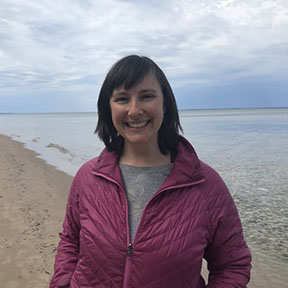
 back to all news
back to all news
Meet the future of Behavior, Education and Communication: Maggie Halpern (MS ’23)

When Maggie Halpern (MS ’23) was thinking about graduate school, she was drawn to many subjects, including law, social work, education and public policy. She didn’t find the right fit, though, until she discovered the Behavior, Education and Communication (BEC) specialization at the University of Michigan School for Environment and Sustainability (SEAS).
Halpern, who had worked in food systems for 15 years and is interested in the “how and why of things,” found SEAS appealing because of its combined emphasis on the social sciences and environmental sciences.
“SEAS is a good fit for someone like me who didn’t earn a Bachelor of Science degree in undergrad,” said Halpern, who graduated with an art history degree from Sewanee in Tennessee and grew up in the Blue Ridge Mountains in Harrisonburg, Virginia.
 “It’s a community that values different backgrounds and viewpoints, which is important because sustainability is an all-hands-on-deck problem that applies everywhere.”
“It’s a community that values different backgrounds and viewpoints, which is important because sustainability is an all-hands-on-deck problem that applies everywhere.”
Halpern liked the flexibility of the BEC program, which allowed her to supplement core BEC classes with those in environmental justice, social work and public policy.
Especially impactful for Halpern was the Localization course taught by SEAS Professor Ray De Young, which focused on “how we live our daily life and how we can envision it to be materially different,” as well as classes taught by SEAS Professors M’Lis Bartlett, Kyle Whtye and Bilal Butt, which emphasized how “sustainability and justice and are interlinked,” something Halpern understood from her food systems work, which had opened her eyes to “labor issues and the exploitation of the people who grow, harvest, sell and cook our food.”
Halpern also focused on food systems for her master’s project, which involved completing an assessment of carbon accounting in food systems in the United States and identifying leverage points where this data can help advance sustainability goals. The research was done on behalf of GreenSwapp, a Netherlands-based company founded by a dual SEAS and engineering alumnus that helps track the climate impact of food products.
Beyond her classes and master’s project, Halpern had the opportunity to attend a conversation with climate scientists Katharine Hayhoe and SEAS Dean Jonathan Overpeck, which offered a chance to hear new perspectives on the climate crisis and affirmed Halpern’s commitment to the BEC specialization.
“What Katharine said really underscored the importance of BEC for me,” Halpern said. “Climate change isn’t a technology problem, and it isn’t an information problem. It’s a behavior problem, and we need to empower people to make behavior changes across the board that will improve the earth and our own well-being.

“The earth provides us with everything to meet our daily needs,” she added, “but the use of fossil fuels and the pursuit of infinite growth has moved many away from that recognition, leading to our sustainability crisis.”
After graduation, Halpern will complete a summer fellowship with ReDirect, a nonprofit started by SEAS Professor Emerita Rachel Kaplan, a leader in the field of environmental psychology. Halpern will assist the Ann Arbor Office of Sustainability and Innovations in making their projects more effective and successful.
Halpern also plans to continue two personal projects that are outgrowths of her coursework. One project, which began last summer with support from the Edna Bailey Sussman Fund, involves working with Trinity Health Ann Arbor Hospital to create dedicated green space on their campus that is designed to foster health and well-being, while the other is working with Assistant Professor Melissa Duhaime in U-M’s Department of Ecology and Evolutionary Biology to create a circular textile economy with wool and flax in the Great Lakes region.
Halpern’s advice for students following in her footsteps? Think beyond the classroom by getting to know other students, and broaden your knowledge by taking advantage of the different events that SEAS and U-M offers. “It’s those extra things you do outside of class that can really make your SEAS experience more positive,” Halpern said.

